Using PPC for Local SEO

We are all aware of the importance Google has been placing on local search over the last couple of years, we touched on it in a recent blog post.
Google also has some interesting statistics on local numbers pertaining to small business stats and Google's local stats (20% of searches have local intent).
As a local advertiser, starting an SEO campaign in your local market is typically built on the strength of your keyword research. Say you are an insurance agent, do more people use car or auto when searching for auto insurance? Do people use "city/town keyword", "city/town, state, keyword", "zip code keyword"?
Some of these questions can be answered using a tool like Google Trends. Here you can see the results for "Texas Doctor" versus "TX Doctor":
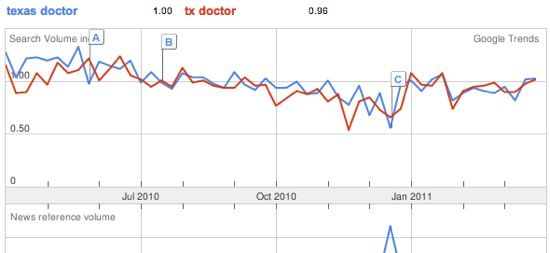
So here you can see that it's pretty close, and volume is pretty close in Google's keyword tool as well:

However, when you get into phrase match the volumes separate a bit:

Overcoming Keyword Tool Volume Concerns
The other thing you'll want to keep in mind is that sometimes these tools can be off on volume, sometimes a lot and sometimes not so much. How do you solve this? You can do a PPC campaign to test a few things like:
- actual search volume of your chosen keywords
- conversion rates on keywords
- additional keywords that trigger your ads via the Search Term Report in Adwords
The beauty of starting your campaign with PPC is that you can not only keep it running if it's profitable for you, rather than it just being a proving ground for keywords, but you are able to discover keywords and keyword groups that are profitable and have enough volume to where an investment into SEO is worthwhile.
Local search, by definition (since it is roughly a quarter of the search market), is on the lower end of the volume pole but in comparsion to a local business's resources and reach the volume is typically relative to that of keywords for a national company pursuing non-local keywords country wide.
Thinking About Campaign Structure
In addition to finding juicy keywords and keyword themes to build on, you can eliminate the poorly performing ones or the ones which have close to no volume from your PPC campaign and remove it from your SEO planning. This not only helps your PPC account grow and mature but also helps you avoid wasting time and resources on chasing irrelevant or unworthy keywords.
As we discussed, sometimes local keywords can use a variety of modifiers like the city or town name, the state name, and the zip code in conjunction with the keyword(s) so making sure you are targeting the right mix from an SEO perspective is really helpful in getting quicker and better results. There is no point in optimizing your on-page content and targeting your link building plans on your keyword(s) plus a zip code if your market is searching by city/town and state (and vice versa). In the interest of time and better results, it makes sense to nail down the correct keywords upfront.
Starting off with Research

Generally, my initial research process goes something like this (we are assuming you've got a live site already):
- look in analytics to find keywords that you are already receiving traffic for
- see if there are any trends in that data in terms of language (car vs auto insurance for example)
- begin broad keyword research to find terms related to the market (exclude local modifiers for now)
- use free mindmap software or free site planning apps to visualize the main content areas of the site with those keywords
- use google trends and insights, in addition to the google keyword tool and the free seobook keyword tool to compare data points on core terms (again, like with car/auto insurance or home versus homeowners insurance)
- make a list of competitors in my area and check the volume on their brand name
So now I should have a good idea of which keywords I want to look at locally and some notes on any glaring differences in volume between closely related terms.
Going Local

Now it's time to "localize" the data. I like the local keyword tool over at PPCblog.com because it does a really good job of working in all the different local modifiers that can be associated with your local PPC campaign.
That is a paid tool, as part of the PPC blog community and training membership (along with a lot of other quality PPC tools), and it's quite robust and easy to use.
If you are looking for a free tool along those lines, with less on the functionality front, you can use this free tool from 5minutesite.com.
Then I move into searching on some of the core terms in Google's keyword tool and the SEObook keyword tool (powered by Wordtracker). Many times you'll find nothing for some of your local searches, in terms of volume, but you should still keep them around for testing in PPC because keyword tools can be off on local searches based on their traditionally lower volume sets. Also, most keyword tools don't or can't allocate resources to capture every single search.
So now I should have a list of locally modified terms where the keyword portions were driven by non-local keyword research and local modifiers were added via a local keyword tool.
In addition, I should have notes and screenshots of data from Google Trends and Insights showing any language differences (of substance) both nationally and locally (locally when available, sometimes no data exists in the tools). I also should have notes as to any language or keyword trends I found in my analytics or tips I received by talking with employees who deal with customers as well as my own knowledge of the industry.
Working with AdWords
There are different ways of attacking your campaign in AdWords. Initially, I am just doing this for testing on an SEO campaign but if you decide to stick with the PPC campaign you can get into removing the local modifiers and bidding on those broader keywords while targeting searchers geographically.
Google has a few different ways of targeting users based on location:
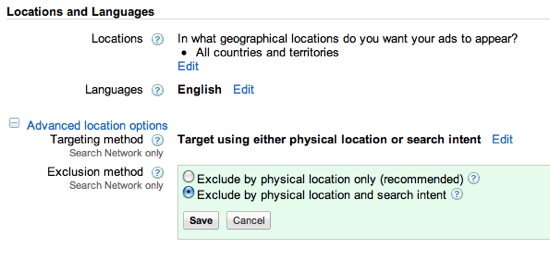
Locations and Languages offer you the ability to target in 4 ways:
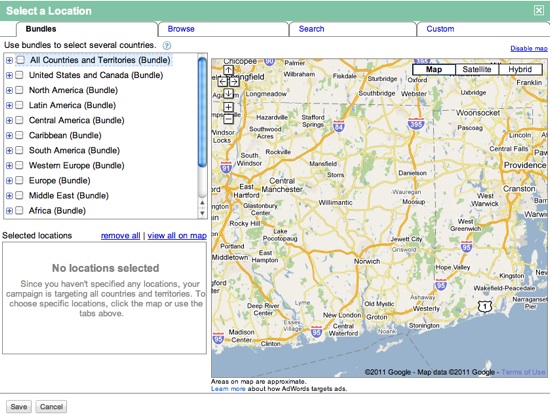
- Bundles - mostly specific countries (United States, Spain, Canada, etc) and regions (North America, Central America, East Asia, etc)
- Browse - essentially goes country - state - metro area - specific city or town
- Search - search for and add just about anything (country, state, town, zip code to find towns or cities)
- Custom - a nifty point, click, drag interfact where you can isolate a specific area where you want your ads shown
You also have some advanced options like the Targeting Method:

Google has a really helpful chart on this here, and below is a screenshot of the information:
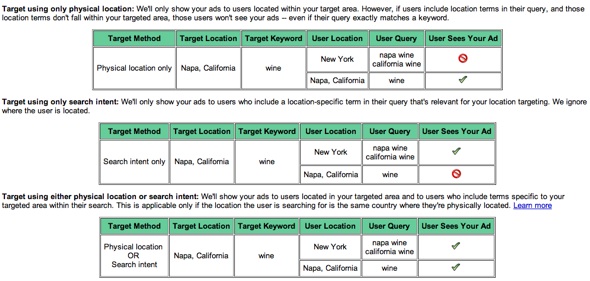
I like to leave both on as it helps with gauging not only the potential of your keywords but also the overall level of activity for your services (via keywords) in your market. Plus, the search term report can help you breakdown keywords that trigger your ads and this kind of PPC can help you show for broad SEO terms that you might not have the resources to compete for.
Another advanced targeting option is the exclusion method:

Google has information on this method here and here's a chart showing the relationship:
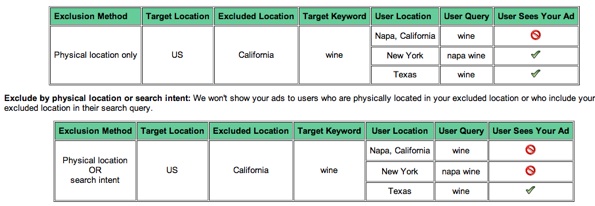
I like to use this in some cases where there may be towns that overlap. For example, you could live in Maine and be targeting "Augusta" as a modifier but you'll probably want to exclude Georgia from your targeting as that is another area which can produce searches for that modifier. You can also get around that by adding a state modifier, Augusta Maine Insurance or some such, but you may find many folks use just the city or town name. That is when exclusion methods can be helpful.
Starting off on the Right Foot
Now I'll start to build the PPC campaign and pay attention to some of the core principles of trying to obtain a good quality score and good overall performance for a new account:
- tight ad groups with keywords that are relevant to the ad group and the query
- quality landing pages which speak specifically to the intent of the query (don't use a generic insurance template for all the different kinds of insurance you sell)
- starting off with a managable amount of keywords to help focus on quality of traffic rather than quantity, and to help promote good keywords and remove or isolate bad ones
As an example, you might be selling life insurance in a few different towns. I would consider using town-specific ad groups -> keywords -> landing pages as my structure.
You can use helpful landing pages for a specific town by talking about things like average family size in the town, average income, and so on to help residents get a more customized experience when shopping for life insurance.
You can also build product-specific ad groups and group your town/city modified keywords in there if that makes more sense for your specific campaign.
Waiting for Results
In about a month or less I should have a pretty good idea of:
- search volume for my proposed keywords
- new keywords that I didn't find initially
- which keywords convert and which don't
- will PPC fit into my ongoing marketing efforts?
- what type of SEO investment does my search volume call for?
We live in a world and business environment where we want things yesterday and sometimes it can be tough to play the patience game. In my opinion, lack of patience is a leading cause of SEO and PPC failure these days.
If you take the above approach with a new campaign or a new idea, you will thank yourself in the short, mid, and long run. There are few sources of advice better than hard data, whether it tells you what you do or don't want to hear.
Free Google AdWords Coupons

Google is advertising a free $75 coupon for new AdWords advertisers, and offers SEM firms up to $2,000 in free AdWords credits via their Engage program.




Comments
Thanks for the insights, I have some good seo skills, but just basic ppc knowledge. so this helps a lot.
This is a great article with in depth look at a variety of tools that can be of massive help. Here is one other way a PPC campaign can help with SEO work. Some tools are indistinct with regard to certain keyword trends, specifically if you want to know if a certain phrase for a business/service in an area is more popular with the geo phrase first or the service first: i.e Chicago auto insurance or auto insurance Chicago.
Suppose those are critical keywords for your site/business. Which phrase is more prevalent. Sometimes the difference is very significant. Sometimes there isn't much difference between whether people use the geo phrase first or the service first.
Ultimately there is no better way of knowing that than by tracking impressions using a PPC campaign. It can be a big difference. Would you rather put your SEO muscle and efforts into the phrase that represents 70-75% of the combination of searches or the phrase with 20-25% of the searches. A PPC campaign using exact phrase gives you keen insights into which terms are more popular among searchers.
Very useful article. I appreciate the step-by-step details and we will definitely share this with our clients. I do have a question though. TMP Direction Marketing/15 Miles’ 2010 white paper, “Bridging the Gap, From Search to Sales,” points out that 70 percent of local customers start their product/service search online, but only 9% purchase online, instead 38% call and 36% visit a location in person. For local businesses, this makes understanding PPC conversions difficult. For our customers, we recommend they integrate call tracking numbers into their PPC campaign to record offline phone conversions. (Full disclosure, Mongoose Metrics is a call tracking solution.) My question is, do you have any recommendations on how to track PPC conversions from those customers that physically visit a location?
IMHO about the only way to get people to volunteer information reliably is a reward mechanism of some sort, like a coupon with a code that is either online specific or has more advanced tracking information embedded in it.
Add new comment